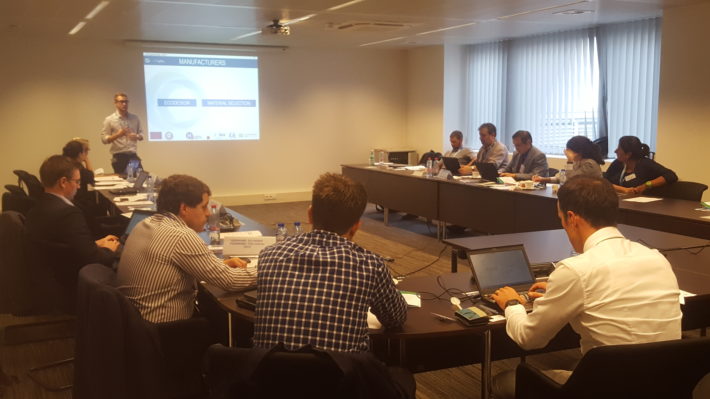Coordinated by the Aragon Hydrogen Foundation, it intends to anticipate the deployment of FCH technologies by addressing their recycling and valorization from the technical and regulatory point of view.
The HyTechCycling project, coordinated by the Foundation for the Development of New Hydrogen Technologies in Aragon, which is based at Walqa Technology Park, recently held its first Workshop at the Fuel Cells and Hydrogen Joint Undertaking (FCH JU) in Brussels, the main public-private partnership of the European research and innovation program Horizon 2020, which supports research, technological development and demonstration activities on hydrogen and fuel cells in Europe.
It was a meeting dedicated mainly to the potential agents involved in the recycling of hydrogen technologies as manufacturers of batteries and electrolysers, end users and recycling centers. That is the main objective of HyTechCycling, anticipating the deployment of hydrogen technology addressing existing and future actions of recycling and its necessary legislative accompaniment.
In this first meeting the members of the consortium presented the results achieved so far in the study of the components of hydrogen batteries and the various existing recycling technologies, but also proposals to facilitate their implementation in companies and recycling centers which will be responsible for the classification and treatment of materials.
During the workshop, advances were made in the study of the Life Cycle Analysis (LCA) of fuel cells and electrolysers and of the various auxiliary elements that are necessary for their optimum operation. This identification is key both to characterize how clean these technologies are and to understand more clearly which are the most harmful components for the environment.
A preliminary analysis of the regulatory framework was also presented, analyzing the different European regulations that can affect these technologies and identifying possible improvements. One of the reasons of the existence of the HyTechCycling project is the lack of specific European legislation for hydrogen technologies. Existing recycling techniques and their relationship to common and non-recyclable materials also focused on the meeting, a very important aspect because knowing which components are critical and to what extent they can be recycled is crucial. In this sense, the participation in the meeting in Brussels of representatives of various companies, whose collaboration is essential to bring this project closer to the real business environment, was decisive.
In addition to the Aragon Hydrogen Foundation, they participate in this three-year European project (2016-2019) and financed with about 500,000 euros by the Fuel Cells and Hydrogen 2 Joint Undertaking, the Spanish company Grupo López Soriano, IMDEA Energy Institute from Spain, Environment Park of Turin (Italy) and the University of Ljubljana (Slovenia).


